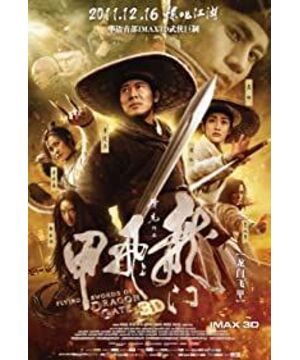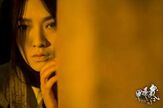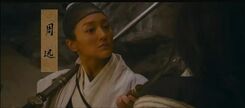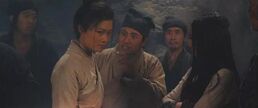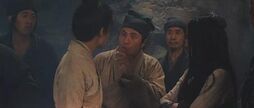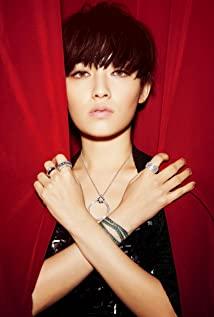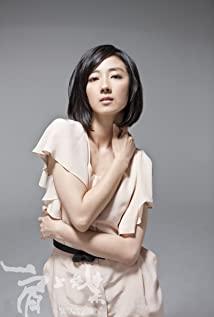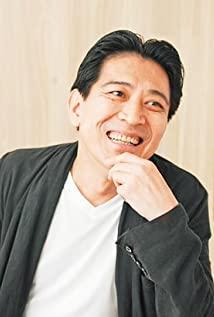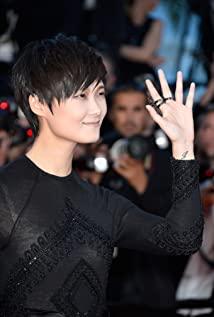"Dragon Gate Flying Armor" is certainly not a bad film, but for Director Tsui Hark, it is definitely not a good film. The script is normal, the performance is normal, the standards of photography, music, and editing have declined quite a bit, but the costumes, makeup and art are quite outstanding, the action special effects are very general, and the scene special effects are quite good. Due to the technical jerky, wearing glasses on the IMAX big screen may be a bit incoherent and awkward, but it is still worth buying a D9 for collection.
Let's talk about 3D special effects
. Since it is the banner of the main 3D martial arts film, let's start with the film technology. A lot of people complimented the film's visuals, and I felt the opposite. The CGI overlooking the port at the beginning of the film amazes me, but the more it goes on, the worse it feels.
It is true that the highest realm of 3D movies is to let the viewers enjoy the shock of 3D visual effects while forgetting your big glasses clipped to their ears, which requires perfect plot design and story tension. "Dragon Gate Flying Armor" took nearly an hour to really make me forget the existence of 3D. This is because in the middle of the film, the post-rendering of the stereoscopic performance is relatively rough, and even the single camera position is directly used, and the foreground photography is almost fixed. moveable. You don't have 3D, I have no sense of 3D.
Since IMAX technology uses dual cameras and dual projectors for shooting and projection, the actual key is the degree of coordination during dual-camera shooting and post-processing, rather than the camera position and action language performance of traditional film shooting. The concept has been completely subverted. On one point, I think "Flying Swords of Dragon Gate" is not well done. Of course, this is a long-term issue for all Chinese filmmakers. Many times, the sudden close-up of hidden weapons makes people feel very fake; the phoenix dance and yellow sand are fine to watch alone, but it will not work when it is connected with the scene of the inn or palace; a large number of flying eaves and walls seem to be pieced together in the 2D dimension space. Not to mention the picture saturation.
3D movies use the horizontal viewing angle difference to interpret the sense of space, instead of the traditional movies that use light changes to provide the depth of the picture. The reason why I often don’t feel the sense of space is because the balance and coordination of the two pictures are insufficient. To give a few examples, in the fight between Jet Li and Liu Jiahui at the beginning of the film, the flying log was out of tune with the fighting scene, and was quite different from the visual performance of Avatar. When there is a panorama of the ancient desert country, the large-angle photography brings a static CG image. The special effects of the scene are no problem, but you can't use the halo processing technology in the game to make 3D movies.
As for post-production, due to the huge difference between the special effects of stereoscopic movies and traditional editing, you need to render each sub-shot file one by one, provide layers and channels for compositing, and then form a dual-view image. This is a pure technique Well, the Korean special effects team doesn't seem to be doing a particularly good job.
There are also problems with post editing. A scene of escaping the palace used a considerable amount of special effects, and the time was not short. However, the screen went black, and then there was a warm goodbye that was forgotten in the rivers and lakes, and even the sound effects were not cleaned up, so it was so bluntly connected. Of course, this issue is not necessarily the responsibility of the director and the producer because of the rift between the filmmakers, producers, and supervisors that are common in Chinese films.
In general, it was originally a pure "Tsui Hark style" martial arts film. It is quite satisfactory and has a unique style. It is already a blessing for hardcore Tsui Hark movie fans. As a result, I boldly adopted IMAX, but I was timid.
As for what reporters have been saying recently in the media, "It's too realistic, I'm afraid of being hit by a stone, so I can only keep closing my eyes." I think either this is the first movie this reporter watched in his life, and his young mind was really shocked, or the red envelope smashed his eyes and had to close his eyes.
The story of the script
"Dragon Gate Flying Armor" - especially the script framework, is much weaker than that of "New Dragon Gate Inn". Of course, it does not mean that its plot is mentally retarded, there are many mistakes, or that what should be round is not round, and what should be explained is not explained. Compared with most domestically produced films, it is very rigorous. It's just that compared with the previous work, the plot is really mediocre, and there are very few ingenuity in the details. Unlike "New Dragon Inn", it is almost impossible to beat the table every ten minutes.
The story is very simple, Jet Li killed the little boss of the East Factory, so the boss of the West Factory, who always wanted to replace the position of the East Factory, decided to kill Jet Li. After being rescued, a group of people escaped and escaped to the Longmen Inn, and they happened to meet a few people who wanted to hunt for treasure, including Li Yuchun, Gui Lunmei, and Chen Kun. After fighting, fighting and fighting, all the subordinates of the boss of the West Factory died. The boss and his agents were killed anyway.
In fact, martial arts dramas are nothing more than such a routine. This script is not shocking. As long as the essence of the "Dragon Gate Inn", that is, the intrigue and intrigue of the people in the inn, perform well, it will naturally succeed. But the melodrama is obviously not so easy to shoot. "New Dragon Gate" has achieved the ultimate in this, and it is naturally difficult for latecomers to surpass it.
Relatively speaking, the idiom "Flying Armored Dragon Gate, you will know the truth and falsehood" is a bit bloody, and the handling of a counter-scheme is too simple. Such a paediatric strategy appears in Tsui Hark's film, which seems a bit mentally retarded.
I can understand that the director took a lot of space to explain the origin of the word "Dragon Gate", first of all, hoping to form a strong echo with the previous work - just like most trilogy Hollywood commercials do. The second is to extend one of the main lines of the story: treasure hunting more rationally, so that it will not be so abrupt that a few people and horses gather at the Dragon Gate Inn again.
This was originally very good, but when you were shooting Xinlongmen, you didn't deliberately lay the groundwork. The fighting scene in the secret passage of the inn lasted for fifteen minutes, so it was completely unnecessary. In the inn, Zhou Xun lied to Xichang, Chen Kun lied to Xichang, Tatar lied to Xichang, everyone lied to Xichang, and the whole pediatrics department. All these bridges can be finished in five minutes, because they are not advanced. Tangtang specially set up a spy organization with this IQ, no wonder the Ming Dynasty will perish. (Thinking about it this way, is this a political metaphor for the director?) And at the beginning of the film, the boss of the West Factory showed off the twinkling swords, which are even better than the twin swords of the previous work, Tony Leung Ka Fai, but just in The big battle I was looking forward to is coming, why did I replace it with a small broken dagger? In addition, if you want to set up a spy, you have to set up the foreshadowing. If you lose the sachet twice in a row, the fool will know what's going on. Who will be surprised when you go against the water? The most uncomfortable is the big boss of Niu Xing. Since he is so arrogant, he must be wise. If someone says I want to duel, you will really run into the tornado.
Performance and style
The film has not been released yet, in fact, Tsui Hark has already succeeded in half. Because there are three good rows in hand, but it seems that he is not playing well.
The first card is the huge influence of "Tsui Hark Jianghu" on an entire generation, but it seems that the Tsui Hark law of "where there are people, there are Jianghu" only flashes sporadically at the beginning and end of the film, and the axe is chiseled. quite heavy.
The second card is that this film includes two actors who may have the best acting skills in the Chinese film Mesozoic, Zhou Xun and Chen Kun. In addition, Jet Li's performance has also undergone a qualitative change since the "Vote for the Name". Fan Shaohuang and Lau Ka Fai are among the nearly 100 supporting actors in Hong Kong with excellent acting skills. As for the joining of Gui Lunmei and Li Yuchun, it may be from the consideration of the film's box office, but their performance Consistent performance is not bad. It's a pity that the director didn't knead these people together. After two hours, there was almost no chemical reaction. Only Chen Kun was surprised, not Zhou Xun.
The third card is the huge imagination space of the golden signboard of "Dragon Inn". In the scene dimension similar to melodrama, the dramatic conflict is the easiest for the audience to accept intuitively, but unfortunately it is still not enough.
As far as the actors are concerned, apart from Chen Kun, Fan Xiaoxuan and Li Yuchun are good, they all sing, which is a successful example of switching to the big screen. Zhou Xun's consistent agility and thoroughness are absent in the film, which can also be explained by the character settings. But where did Jet Li run to, and where is the hero Zhao Huaian "big"? Big belly or big face? Gui Lunmei is one of the rare Taiwanese young actresses who is very expressive in camera shots, but she can't play this Tatar woman. No matter her eyes and demeanor are really nondescript, she can consider trying some Xu Anhua movies in the future. The queen can get a lot.
In general, Tsui Hark made this film with great sincerity and sincerity, but it can't be called intention, and the innovation is even more lackluster (this is because Tsui Hark has always been known for 'daring innovation'). If you watch the whole film, you can clearly feel that the birth of Longmen Flying Armor was more or less directed at the box office and market demand. In other words, the director hurriedly started filming without being fully prepared, and made a book. Coupled with his weakened narrative ability (or not strengthened, so it is particularly abrupt in the current film environment), disappointment naturally ensues.
In Tsui Hark's mid-to-late film works, he almost played the role of a forerunner of Chinese-language films - and not limited to the field of martial arts films, which is his most valuable part. Tsui Hark's films that came out after 2000, such as The Legend of Shushan, Deep Sea Searching, and the Iron Triangle have been questioned and criticized a lot. I think this is unfair. The value of "Shushan Chuan"'s brave attempt on film technology has become more and more obvious today; "Deep Sea Searching" is considerably constrained by post-editing and mainland censorship, and benefits from the convenience of working relationships, I Having seen the full director's cut version, it can be said that the level of this film is much higher than the presentation in the big cinema. "Di Renjie Tongtian Empire" rarely retains the spirit of inquiry into humanities and emotions in commercial films; and "Seven Swords", which has a mediocre response, has a higher emotional interpretation, exploration and thinking than this Dragon Gate Flying Armor.
Frankly, I think Tsui Hark put more effort into "Flying Swords of Dragon Gate" than the above-mentioned films, and he also seems eager to use this film to close the gap with Hollywood blockbusters as much as possible. However, the problem also seems to be here. "Dragon Gate Flying Armor" is far more dependent on technology than all of Tsui Hark's old works. The ability of Korean special effects workers is naturally twice that of ours, but the gap with Hollywood is also like a huge gap. This is in Feng Xiaogang. It was very obvious when they were asked to make the "Assembly". On another level, when a CGI drawing appears in a few seconds and occupies most of the space in your mind, the biggest capital that Tsui Hark relies on for his existence—feelings, how much spare energy do you have to experience with your heart?
Feelings
like those of us born in the 1970s or 1980s are familiar with Tsui Hark movies. It can even be said that the true character of the hero (producer), the two heroes of bloodshed (producer), the green snake, the new dragon gate inn, the proud all corners of the world The series (the first as an executive producer), the Once Upon a Time series, A Chinese Ghost Story (an executive producer), these films are one of the most important thrusts and social enlightenments we grow up with.
In my impression, Tsui Hark's first martial arts movie was "Swordsman", and its influence on movie fans in mainland China was amazing. At that time, I lived in Shanghai, and on the big lawn in Zhongshan Park, every night a big white cloth was put up to show open-air movies. I remember that for a month, every night was the 1 or 2 episodes of "Swordsman". , It is not an exaggeration to say that the streets are empty. A month later, the "Once Upon a Time" series was broadcast all night long, leaving no grass in the park all year round.
From the bloody two heroes, the heroic righteousness of the rivers and lakes, the grievances and grievances of the world, to the elegant and blurred ghosts in A Chinese Ghost Story and the Green Snake, the scenery that others cannot imitate and the carefully laid out political metaphors; From the arrogant, joking articulate and comic-style quick editing style, to the violent aesthetics of bloody knife and straightforward killing. Director Tsui Hark always tries to change, which is commendable.
In addition, he also made a lot of films in various styles, modern films (Beautiful Period of Flower and Moon), idol films (women are not bad), pure romance films (Liang Zhu), New Year films (Full Banquet of Man and Han), thrillers ( Psycho), sci-fi films (Monster City), Hollywood action films (counter-attack, double firepower), public welfare films (big family banquet), monster films (Dao Dao Dao)... He also published a comic book (Tianya Mingyue Dao), and more Made a fake 3D cartoon (Xiao Qian) that was a little different, and it seems that he was nominated for the Golden Horse Award as an actor (this probably makes those actors who have made movies all their lives feel bad) - Tsui Hark seems to want to prove that he Can handle any style of film. Whether or not this is the case is a matter of opinion.
However, no matter how changeable Tsui Hark's film styles are, everyone knows that the only thing he likes most and can best represent the word "Tsui Hark" is martial arts films. If you have to study it carefully, Tsui Hark's costume martial arts movies have roughly gone through five stages: "Swordsman" is the way of traditional martial arts. However, when the film was completed, he found out that his concept of martial arts movies was the same as that of "teacher" Hu Jinquan. The forbearance, restraint and moderation are completely different; so he personally went out to film "Eastern Invincible", freeing up all kinds of box-office jokes, sharpness, modernity and tricks into Jianghu chivalry and homesickness, and finally found this It's a bit strange; by the time of "Once Upon a Time", Tsui Hark's personal style was completely formed, and the character of a civilian martial arts hero was presented in full, "down-to-earth boxing and kung fu" - I personally commented on Tsui Hark's peak period; When it comes to shooting "Knife", he tried to abandon all the world of Hu Jinquan, and replaced it with a more thorough style of pure yang violence than Zhang Che, abandoning all aesthetics, and the attempt to make a male martial arts film can be described as a success. As far as I am concerned, Tsui Hark's "Knife" and He Ping's "Double Flag Town Swordsman" are the two monuments of Chinese martial arts films; finally, there are a large number of new martial arts that rely on film technology after the transformation, including Shushan Legend, Seven Swords, Di Renjie and Longmen Feijiao - for now, I don't think it has worked out.
Tsui Hark's influence on us is that he can always use nostalgic film texts to write a scene-by-scene bridge between your real life and virtual rivers and lakes, which is not so much a movie as a fable. He bound the chivalry, character, tenderness, helplessness and loyalty of Jianghu people to family, grievances, the background of the times and even the righteousness of the country. So he influenced our growth, just like Luo Dayou did in the field of music. If he just does his punches and kung fu so that the coach of the national martial arts team can't pick out any faults, or if he ties everything to Weiya and flies around, this is not a "martial arts movie".
In this sense, in addition to gaining some audiences who like plots, beauties, fighting scenes and cool feelings, Tsui Hark has also gained some higher-level cultural identity. And this kind of cultural identity does not exist much in "Dragon Gate Flying Armor". Its feelings are superficial, its cultural attributes have been castrated by technology, and it is just a commercial film that is still in the future—— Just make money.
View more about Flying Swords of Dragon Gate reviews


